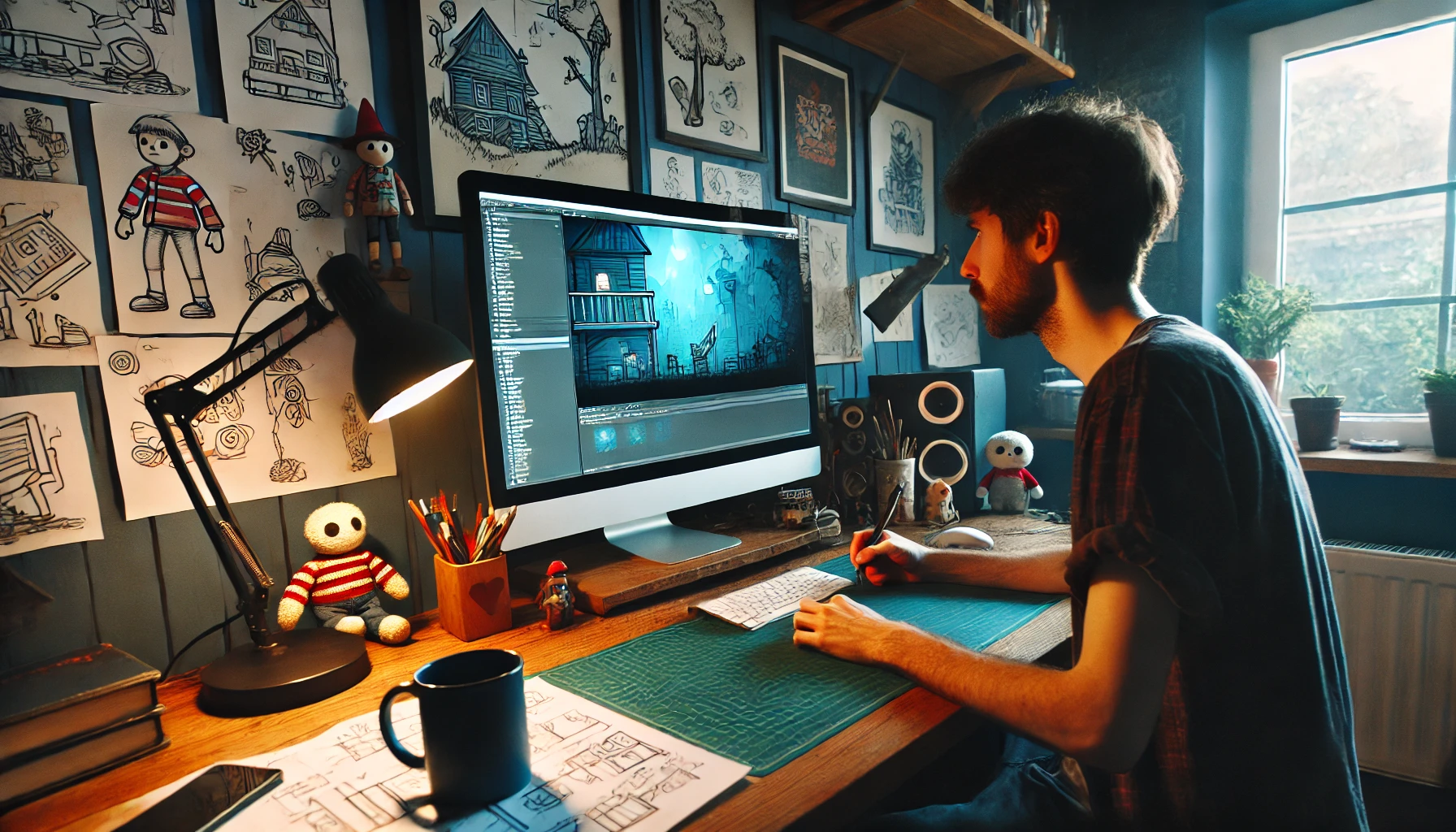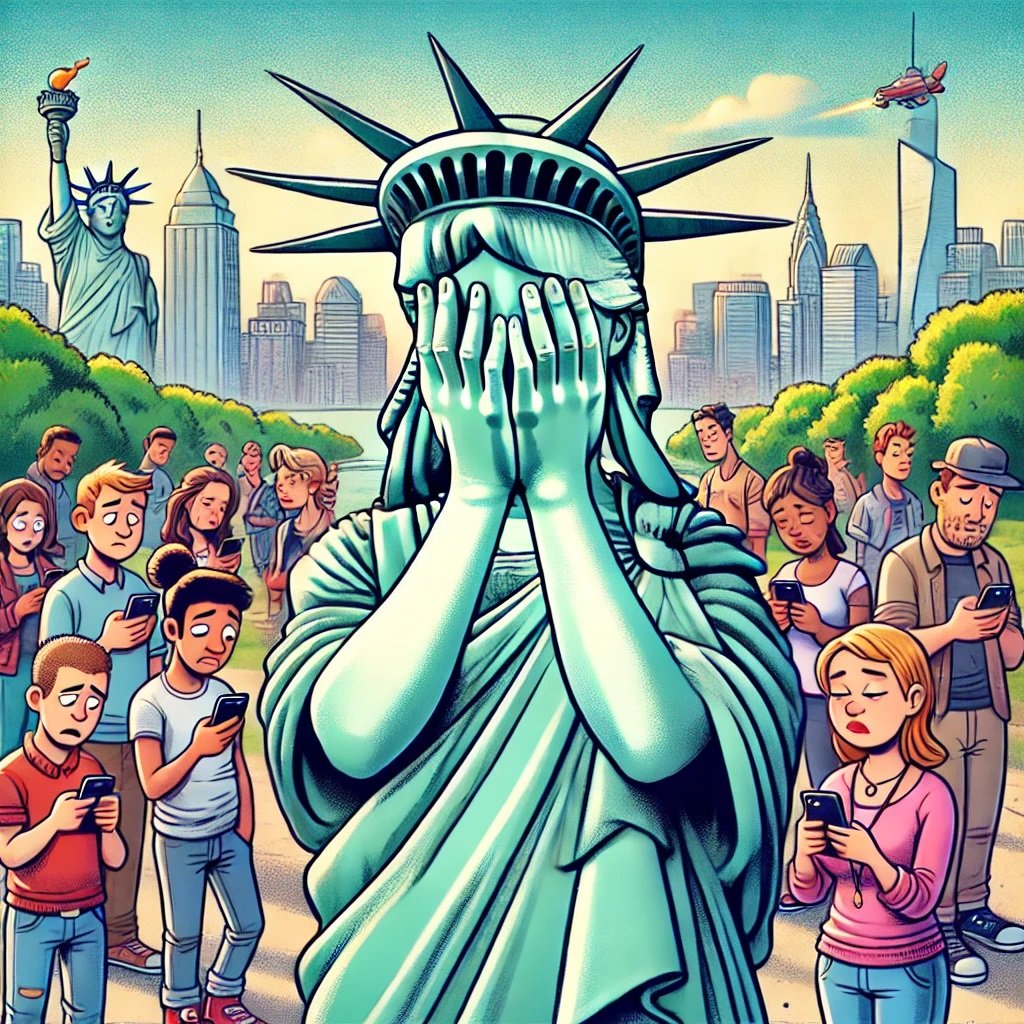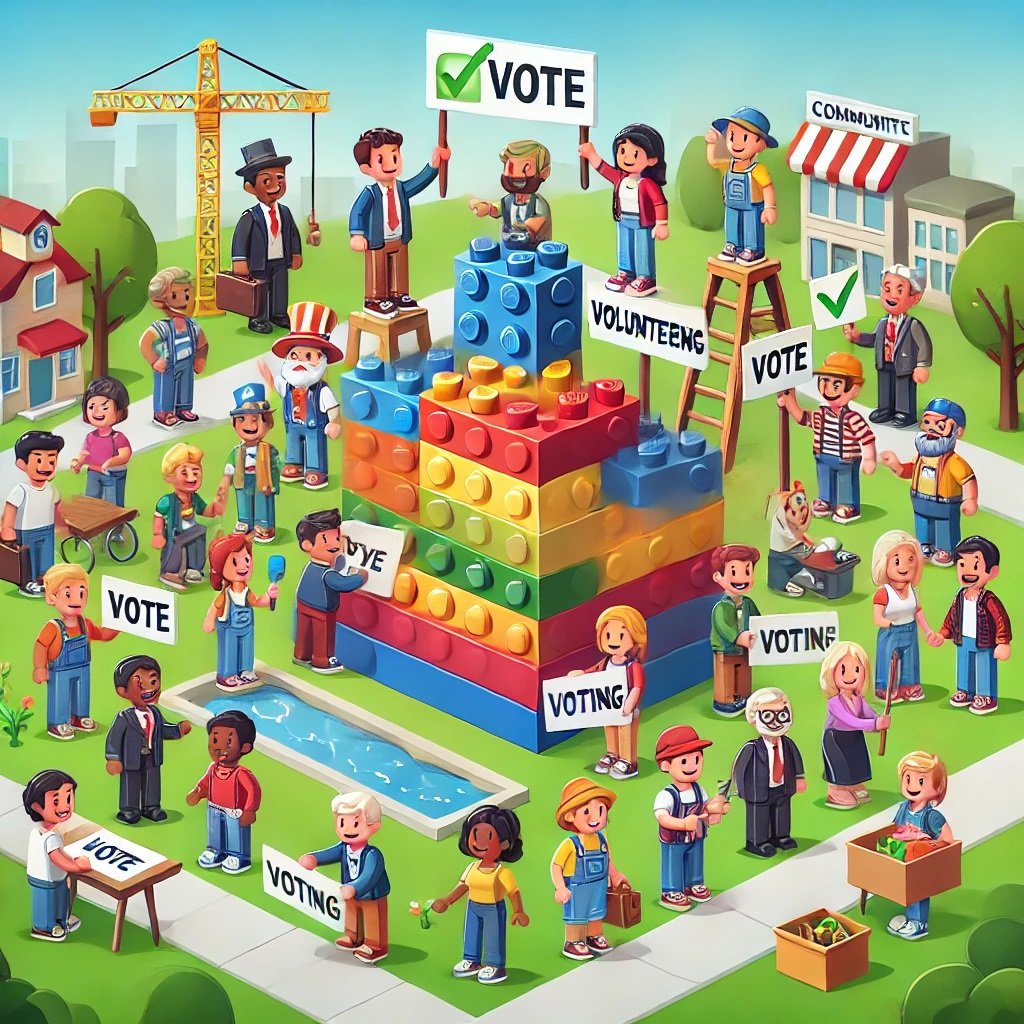Your cart is currently empty!
Wake Up and Smell the Democracy: Why Your Lazy Ass Needs to Get Engaged


Democracy’s Midlife Crisis
Listen up, fellow disgruntled citizens! Our democracy is having a midlife crisis, and it’s not pretty. We’re talking less “buying a sports car” and more “system-wide breakdown with a side of existential dread.” But before you reach for that bottle of political apathy, let’s talk about why your participation matters more than ever — even if you’d rather binge-watch paint drying.
1. Democracy: It’s Not Just for Fancy Paintings Anymore
Democracy isn’t some crusty concept that belongs in a museum next to the dinosaurs and your grandpa’s favorite sweater. It’s a living, breathing entity that requires your attention more than your needy ex ever did.
At its core, democracy is about having a say in how your world operates. It’s like being part of the world’s largest, most dysfunctional homeowners’ association, except the stakes are slightly higher than whether your neighbor can paint their house neon pink.
Elections are your chance to choose your own adventure, except instead of fighting dragons, you’re battling against potholes, tax hikes, and politicians who think “public service” means servicing their own bank accounts. And let’s not forget about free speech — that beautiful, chaotic cornerstone that allows you to tell politicians they suck without fear of being thrown into a dungeon (usually).
But here’s the kicker: none of this works if you’re sitting on your couch, scrolling through memes, and pretending the outside world doesn’t exist. Democracy needs you to get off your butt and participate. Otherwise, we might as well crown Jeff Bezos as our supreme overlord and call it a day.
2. Why Should You Care? (Besides Avoiding a Dystopian Hellscape)
2.1 Informed Decision-Making: Because Ignorance Isn’t Bliss, It’s Expensive
Picture this: You’re at a restaurant, and the waiter hands you a menu written in hieroglyphics. You point randomly and hope for the best. That’s essentially what you’re doing when you vote without being informed.
Getting involved in civic life is like learning to read that menu. Suddenly, you understand why your town’s budget looks like it was drafted by a drunk monkey with a dartboard. You start to see the connections between that new stadium proposal and the mysterious lack of funding for schools. You become the person at parties who can actually explain why local elections matter, making you either the most interesting or most insufferable person there — your choice.
But here’s why it really matters: Informed citizens are the kryptonite to political BS. When you know what’s going on, it’s a lot harder for politicians to pull the wool over your eyes. Remember that time your town almost voted to replace all the streetlights with glow-in-the-dark paint to “save energy”? Neither do we, because informed citizens don’t let that happen.
Being informed turns voting from a game of eeny, meeny, miny, moe into a strategic choice that actually reflects your interests. It’s the difference between accidentally joining a cult and purposefully joining… well, hopefully not a cult, but you get the idea.

2.2 Accountability: Keeping Politicians on a Shorter Leash Than Your Neighbor’s Chihuahua
Imagine if your boss only checked on your work once every four years. You’d probably spend a lot of time perfecting your solitaire skills, right? Well, that’s essentially what happens when citizens don’t stay engaged between elections.
Civic engagement is like fitting politicians with a political Fitbit. Every town hall you attend, every letter you write, every time you share a hard-hitting piece of journalism (not just cat videos, Karen), you’re reminding those in power that you’re watching. It’s a lot harder for a politician to sneak off to Cancun during a crisis when they know their constituents are more attentive than a helicopter parent on the first day of kindergarten.
This constant vigilance makes a difference. Remember the Flint water crisis? It wasn’t solved by politicians waking up one day and deciding to do the right thing. It took relentless pressure from citizens who refused to let the issue die. They showed up to meetings, they protested, they kept the story in the news. Without them, officials might still be saying, “Lead in the water? Never heard of her.”
When citizens are engaged, corruption has a harder time hiding than a neon-painted elephant in a snowstorm. Transparency becomes less of a buzzword and more of a survival strategy for politicians. And that, friends, is how you keep democracy from turning into a bad reality TV show.
2.3 Social Cohesion: Or, How I Learned to Stop Worrying and Love My Neighbors
Ever been to a family reunion where Aunt Edna’s talking politics and Uncle Bob’s complaining about “kids these days”? Congrats, you’ve just experienced democracy in action.
Civic engagement is like being part of the world’s largest, most dysfunctional family. But here’s the twist: it actually works. When you participate in your community, you’re not just fixing potholes — you’re building connections stronger than your grandma’s fruitcake.
Think about it:
- You finally talk to your neighbors (and no, yelling “Keep your dog off my lawn!” doesn’t count).
- Suddenly, MAGA-hat guy and Prius-driving lady are working together to get a stop sign installed. It’s a Hallmark movie, minus the snow kissing.
- Your community becomes tougher than a $2 steak. Natural disaster? Economic downturn? You’ve got backup.
Take Lessuck, USA. Facing library closure, they rallied with book drives and “Drag Queen Story Hour.” The library stayed open, and they learned Drag Queen Bingo is surprisingly profitable. Who knew?
But it’s not all rainbow flags and kumbaya. You’ll deal with flat-earthers and pineapple-on-pizza defenders. It means uncomfortable conversations and maybe admitting you don’t know everything (gasp!).
The payoff? Huge. Communities become less “Desperate Housewives” and more “Parks and Rec.” People see humans, not walking political billboards.
So, next time you’re hiding from the world, remember: democracy needs you to adult. Get out there and be a neighbor. Who knows? The guy with the loud music might make killer barbecue. Just don’t tell him you’re vegetarian.
3. The Roadblocks: Why Civic Engagement Feels Like Pushing a Boulder Uphill (While Wearing Flip-Flops)
Getting involved in democracy these days feels about as appealing as a root canal performed by a squirrel. Why? Glad you asked, hypothetical reader!
3.1 Disillusionment: The “Why Bother?” Syndrome
You’re not alone if you feel about as empowered as a wet napkin in a hurricane.
- Voter turnout’s lower than your ex’s standards.
- Community organizations are wondering if they should rename themselves “Echo Chambers R Us.”
- There’s a prevailing sense that you have a better chance of winning the lottery while being struck by lightning… twice.
Depressing stat time: In 2020, about 1/3 of eligible voters looked at the presidential election and said, “Nah, I’m good.” That’s like skipping the final season of Game of Thrones… actually, bad example
3.2 Barriers to Participation: The Obstacle Course from Hell
Trying to participate in democracy sometimes feels like trying to file your taxes while riding a unicycle blindfolded. Uphill. In a snowstorm.
- Voter suppression tactics more complex than the plot of “Inception.”
- Economic disparities that make civic engagement feel like a luxury item. “Sorry, can’t make the town hall meeting. Too busy working my third job to afford ramen.”
- Accessibility issues that would make MC Escher say, “That’s a bit much, don’t you think?”
Some polling stations have lines longer than the one for the next iPhone. Except instead of a shiny new gadget, you get… the satisfaction of fulfilling your civic duty? (We’re working on better incentives, promise.)
3.3 Misinformation: When Your Facebook Feed Becomes a Dumpster Fire of Lies
False information spreads faster than gossip at a high school reunion. It’s like playing telephone, except the first person whispers “Maybe we should fix the roads” and the last person screams “THE LIZARD PEOPLE ARE COMING!”
- Trust in institutions dropping lower than your grandfather’s pants at Thanksgiving dinner.
- Communities more polarized than a pair of sunglasses.
- People making decisions based on information less reliable than a weather forecast for next year.
Remember when your aunt shared that article about how vaccines turn people into 5G towers? Yeah, that’s the kind of thing we’re up against.
The Result? A perfect storm of “meh” that’s corroding our democracy faster than cheap vodka eats through a plastic handle. But before you curl up in the fetal position with a pint of “I Give Up” flavored ice cream, remember: every stupidly complex problem has a stupidly complex solution.
4. Resuscitating Our Flatlining Democracy
Democracy’s vital signs are weaker than a politician’s excuse for a scandal. Time to break out the defibrillator and shock this system back to life.
4.1 Education: Making Civics Sexier Than a Firefighter Calendar
American civic literacy is so low, it’s practically subterranean. We’re talking “can’t name the three branches of government” low. It’s less “I’m Just a Bill” and more “I’m Just Confused.”
The fix? Revamp civic education like it’s going out of style (which, let’s be honest, it kind of has):
- Ditch the dusty textbooks. Introduce “How to Spot a Lying Politician at 50 Paces 101.”
- Launch adult education programs more enticing than free beer. Or, hell, include free beer. “Drunk History” worked, didn’t it?
- Create hands-on learning experiences. Less “mock election,” more “take over city council for a day and try not to set anything on fire.”
One school district in Oregon turned their civic education program into a real-world lab. Students identified local issues, researched solutions, and presented to city council. Result? A youth-led initiative to reduce plastic waste actually passed. Turns out, teens can do more than just TikTok dances.
4.2 Accessibility: Democracy So Easy, Your Technophobe Grandpa Can Do It
Voting shouldn’t be harder than assembling IKEA furniture. Yet here we are, with a system that seems designed by sadists with a fetish for bureaucracy.
Time to streamline this mess:
- Automatic voter registration: You’re born, you breathe, you’re registered. Bam.
- Voting options galore: Early, mail-in, carrier pigeon (okay, maybe not that last one).
- Information access that doesn’t require a PhD in Googleology.
Estonia — yes, that Estonia — has online voting. Their voter turnout? Higher than a college student on 4/20. Meanwhile, some U.S. states are still debating whether electricity is witchcraft.

4.3 Community Building: Making Your Neighborhood Less “Desperate Housewives” and More “Parks and Rec”
Communities are more divided than a pizza at a vegan restaurant. Time to stitch this social fabric back together, preferably without getting our fingers pricked.
The game plan:
- Create community spaces people actually want to visit. Think less “dmv waiting room,” more “that cool coffee shop where the barista knows your name and your existential dread.”
- Host local issue forums more entertaining than Netflix. “Real Housewives of City Council” anyone?
- Organize events bringing together all walks of life. Hipsters, hippies, and hip-replacements unite!
In Detroit, an annual neighborhood festival turned into a year-round community engagement initiative. They’ve got urban farms, art projects, and a time bank where people exchange services. It’s like a bartering system, but with fewer chickens and more craft beer.
4.4 Technology: The Double-Edged Sword of Civic Engagement
The internet: Democracy’s best frenemy. It’s given us unparalleled access to information and cat videos, but also flat-earthers and doom-scrolling.
Using tech responsibly in civics:
- Build platforms so user-friendly, even your technophobe uncle could use them. No, Uncle Bob, the mouse is not a foot pedal.
- Privacy protection stronger than your grandmother’s fruitcake. Fort Knox should be taking notes.
- Combine online tools with offline action. Because democracy is also about getting off your butt and into the real world.
The “SeeClickFix” app lets citizens report local issues faster than you can say “pothole.” In New Haven, it led to fixes for 90% of reported problems. Turns out, when complaining is easy, stuff actually gets done. Who knew?
The road to a healthy democracy is paved with informed citizens, accessible systems, strong communities, and responsible use of technology. It’s a tall order, sure. But so was the moon landing, and we nailed that. Time to make democracy one small step for a citizen, one giant leap for citizenkind.
5. Technology: Democracy’s Frenemy
In the grand tradition of fire, the wheel, and sliced bread, technology promised to revolutionize democracy. The reality? It’s more like that friend who offers to help you move, then shows up with a bag of chips and a bad attitude.
Digital tools have given us unprecedented access to information, direct lines to officials, and the power to organize faster than you can say “Twitter mob.” But they’ve also ushered in an era where your racist uncle’s conspiracy theories can reach millions before the truth has finished its morning coffee.
The Good
Civic tech is booming faster than a Silicon Valley startup with too much venture capital. Take “SeeClickFix,” the app that lets citizens report local issues. In New Haven, it led to fixes for 90% of reported problems. Turns out, when complaining is as easy as swiping right, stuff actually gets done.
Or consider Estonia, the little Baltic nation that could. They’ve implemented online voting, digital signatures, and e-residency. The result? Government services run smoother than a well-oiled machine, and voter turnout is higher than a college dorm on 4/20.
The Bad
But for every Estonian success story, there’s a Cambridge Analytica waiting in the wings. Data breaches have become so common, they barely make the news anymore. Your personal information is less secure than a snowball in hell.
Then there’s the digital divide, wider than the Grand Canyon and twice as deep. While Silicon Valley debates the ethics of AI, parts of rural America still struggle with dial-up internet. It’s like trying to run a Formula 1 race when half the cars are horse-drawn carriages.
The Ugly
And let’s not forget the crown jewel of tech’s contribution to democracy: social media. These platforms have turned civil discourse into a gladiatorial arena where facts go to die. Echo chambers are so prevalent, they should come with noise-canceling headphones.
Misinformation spreads faster than a celebrity rumor at a hair salon. Remember when your aunt shared that article about how vaccines turn people into 5G towers? Yeah, that happened.
The Way Forward
So how do we harness tech’s potential without turning democracy into a Black Mirror episode? A few ideas:
- Digital literacy programs that teach people to spot fake news faster than a lie detector on steroids.
- Platforms with privacy protection stronger than your grandmother’s fruitcake. Fort Knox should be taking notes.
- Accessibility initiatives to bridge the digital divide. Because democracy shouldn’t depend on your zip code or data plan.
- Ethical AI development to ensure algorithms don’t have more bias than a Fox News anchor at a Democratic convention.
Some bright spots are emerging. ProPublica’s “Electionland” project uses data and citizen reports to monitor voting issues in real-time. It’s like a watchdog with the nose of a bloodhound and the processing power of a supercomputer.
Meanwhile, Taiwan’s “vTaiwan” platform is bringing citizens and government together to solve problems through online deliberation. It’s like Reddit, if Reddit actually accomplished something besides arguing about Star Wars.
The bottom line? Technology in democracy is like power tools for home renovation. In the right hands, you can build something beautiful. In the wrong hands, you might lose a finger or two. As citizens, it’s our job to be the responsible adults in the room, using these tools to build a democracy that’s more inclusive, transparent, and effective than ever before.
Just remember to wear your safety goggles. This project’s gonna get messy.
Conclusion: Get Off Your Ass and Save Democracy
Look, we get it. Democracy feels about as functional as a chocolate teapot right now. But here’s the kicker: It’s OUR chocolate teapot. And if we don’t start patching the holes and turning up the heat, we’re going to end up with a melted mess that even the most dedicated chocoholic couldn’t love.
Every vote, every town hall attendance, every snarky but informed tweet is a middle finger to the forces trying to turn our democracy into a bad reality TV show. So get out there and participate like your Netflix subscription depends on it. Because in a way, it does.
Remember: A government of the people, by the people, and for the people only works if the people actually show up. Otherwise, it’s just a government of the lobbyists, by the corporations, for the highest bidder. And nobody wants that, except maybe the lobbyists, corporations, and highest bidders.
Your move, citizen. Make it count.
Want to put your money where your vote is? Whether you’re a die-hard supporter or just trying to avoid the alternative, you can contribute to Joe Biden’s 2024 campaign here. Remember, in the world of campaign finance, every dollar counts (some just count more than others).